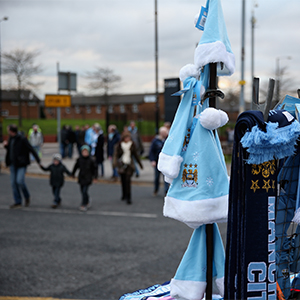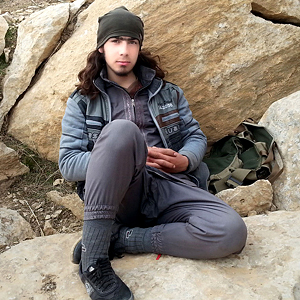The Premier League is 25 years old on 15 August 2017.
To mark the anniversary, BBC Sport has produced five pieces, each covering a five-year period in the competition's history.
This is the first piece, focusing on the span from the first season in 1992-93 to the end of the 1996-97 campaign.
Scroll down for written insight, a visual timeline, Mark Lawrenson's team of the era, a tailored tactics board and tables, before testing yourself with our Merlin sticker quiz.
When Sky's adverts to herald the new Premier League famously promised "a whole new ball game" it was as much about hype and hope as the reality.
A little was new but a lot was still old. The ad featured Gordon Strachan with a 1980s mullet and John Wark with a 1970s moustache, even if David Hirst was wearing an earring and Tony Daley working out with his top off. It was soundtracked by a Simple Minds song, Alive and Kicking, that was seven years old and had more to do with the Brat Pack than the Brit set, let alone the country's nascent rave culture.
All 22 clubs (there were that many) had British managers. Shirt sponsors were the traditional - JVC for Arsenal, Sharp for Manchester United - and aimed at the VHS market rather than the satellite. Others were targeted squarely at the local market rather than overseas eyes: Shipstones and Nottingham Forest, Fisons and Ipswich.
Glamour was hard-working Scandinavians such as Gunnar Halle and John Jensen.
Manchester United's big summer signing was Dion Dublin, for £1m, from Cambridge United. Dublin's new team, 25 years without a league title, would begin the brave new world by losing at Sheffield United.
Only one manager in the division was sacked in that first season. Two years further on, 15 of the 22 Premier League clubs changed their manager during the season or in the close seasons that bookended it.

Ian Porterfield was the only Premier League boss to lose his job in the 1992-93 season, sacked by Chelsea in February and replaced by David Webb
If that was an indication of how quickly the influx of television money and its attendant pressures were altering the landscape, so too were the signings teams were making. By the league's fourth birthday Middlesbrough, who had been relegated in 1993 with a team led by Bernie Slaven playing in a 90-year-old stadium, could celebrate the opening of their new 30,000 all-seater ground with the arrival of Champions League winner Fabrizio Ravanelli from Juventus and a line-up that featured three Brazilians.
Inflation took hold even as the nation's economy flatlined. By the summer of 1995, Warren Barton was worth £4m to Newcastle, which at least made Liverpool feel better about the £3.5m they had spent on his Wimbledon team-mate John Scales the year before. Neither man played a competitive fixture for England.
With each passing season the quality of the football on offer seemed to improve a little more. Strikes that were comfortable winners of Goal of the Month a few years before became humdrum; seemingly impossible efforts from Matt le Tissier and Tony Yeboah reflected the sense of never having had it so good. With it came wonder games too, Liverpool's 4-3 win over Newcastle in April 1996 maybe the best of the lot.
The breakaway had been triggered in part by the Football Association's desire to improve the England team. After an awful European Championship in 1992 was followed by a failure to qualify for the following World Cup, Premier League talent took an invigorated Terry Venables team to the semi-finals of Euro '96.
Of course, they lost on penalties to Germany, just as they had in 1990, just as they routinely would to other nations into the future. But the hosting of that tournament and the national celebration that came with it, Three Lions and all, fed back into the Premier League. Football had come home, and now everyone was into it, even if not everyone could now afford to watch.
There were crises along the way - Arsenal manager George Graham sacked for taking bungs, former Liverpool goalkeeper Bruce Grobbelaar being accused of match-fixing, Arsenal midfielder Paul Merson admitting to addictions to cocaine, alcohol and gambling. Ever more money in the game, ever more temptation.

Arsenal's Paul Merson broke down in tears at a press conference in 1995 following his treatment for various addictions
Nothing was as shocking as when Manchester United striker Eric Cantona launched himself into the Selhurst Park crowd. But then nothing had been as critical to the direction of the league as United's decision to sign the Frenchman close to the start of it all.
When Alex Ferguson brought him in on 26 November 1992, following a phone call from Leeds enquiring about Denis Irwin, United had just gone seven league games without a win and were eighth in the table. Over the next five years they would win the title in all but one, establishing a hegemony that would only occasionally be broken over the next 15 years.
The seeds of the next era were being sown too. On 17 August 1996, David Beckham scored from the halfway line in a 3-0 win over Wimbledon, beginning a transformation that would take football players into the celebrity mainstream and in many cases beyond.
Just over a month later, Arsenal appointed 46-year-old Frenchman Arsene Wenger as their new manager. Few had heard of him. Even fewer guessed the changes he would bring to the Premier League.
Farewell beer, hello broccoli; in with foreign talent, out with the old certainties. Now it was a new ball game, and there was a great deal more to come.

15 August 1992: The Premier League begins. The first goal is scored by Sheffield United’s Brian Deane in the fifth minute of a 2-1 home win over Manchester United.

26 November 1992: Manchester United, who have just gone seven league games without a win and are eighth in the table, sign striker Eric Cantona in a £1.2m deal from Leeds, the team who beat the Red Devils to the title the previous season.

26 April 1993: Brian Clough announces that he will retire as Nottingham Forest manager at the end of the season after 18 years in charge. Clough won two European Cups, the league title and four League Cups with Forest, who are relegated from the top flight a week later.

2 May 1993: Manchester United are confirmed as Premier League champions, finishing 10 points ahead of second-placed Aston Villa. They will repeat the feat the following season, improving their overall points tally from 84 to 92.
29 July 1994: Jurgen Klinsmann - a villainous figure in English football for his role for Germany in England’s semi-final defeat at Italia ‘90 and his reputation as a diver - joins Tottenham from Monaco for £2m. The striker makes a huge impression in one season, scoring 20 league goals, celebrating the first, in a 4-3 win at Sheffield Wednesday on the opening day, with a dive celebration.

10 January 1995: Manchester United break the British transfer record to sign Andy Cole from Newcastle for £7m. Newcastle boss Kevin Keegan takes to the steps of St James’ Park to address fans who are angry at the sale. Cole has an inconsistent first season but does score five goals in one match as United beat Ipswich 9-0.
25 January 1995: As he walks from the field after being sent off at Crystal Palace, Manchester United’s Eric Cantona leaps into the crowd and kicks spectator Matthew Simmons. The Frenchman is banned until 30 September by the FA and threatens to quit English football, but stays and returns to action later in the year.

21 February 1995: It is a difficult season for Arsenal as midfielder Paul Merson goes into rehab for drink and drug addiction before manager George Graham is sacked after admitting receiving illegal payments from transfers.

14 May 1995: Blackburn break Manchester United’s monopoly on the Premier League by claiming the top-flight title for the first time in 81 years. On a dramatic final day, Rovers lose at Liverpool but triumph by a point after United can only draw at West Ham.
19 August 1995: After Manchester United sell Mark Hughes, Paul Ince and Andrei Kanchelskis, Match of the Day pundit Alan Hansen declares that “you can't win anything with kids” as they suffer an opening-day 3-1 defeat at Aston Villa. A United side containing the Neville brothers, David Beckham, Nicky Butt and Paul Scholes bounce back quickly and go on to win the double.

3 April 1996: The best game in the Premier League era? Striker Stan Collymore scores a late winner in a pulsating 4-3 win for Liverpool that crushes title-chasing Newcastle. Kevin Keegan’s side had been 12 points clear at the top at the end of January, but this defeat leaves them three points behind leaders Manchester United with a game in hand.

30 April 1996: After Manchester United boss Alex Ferguson suggests that teams like Nottingham Forest might not try as hard against Newcastle as they do against his side, Magpies boss Kevin Keegan erupts in a live interview on Sky, which includes the now infamous lines: “You can tell him now, we're still fighting for this title and he's got to go to Middlesbrough and get something. And I'll tell you, honestly, I will love it if we beat them. Love it”. They don't.

30 July 1996: Striker Alan Shearer, whose £3.6m move to Blackburn in 1992 broke the British transfer record, leaves Rovers to join his hometown club Newcastle United for a world record fee of £15m.

17 August 1996: Manchester United's David Beckham scores a late goal from the halfway line in a 3-0 win over Wimbledon on the opening day of the season. It is an iconic goal from the man who would go on to captain England on 59 occasions.

28 September 1996: Arsenal appoint largely unknown 46-year-old Frenchman Arsene Wenger as manager. The former Monaco coach arrives from Japanese side Nagoya Grampus Eight and is met initially by suspicion and surprise. Wenger would win the Double twice with the Gunners by 2002.

5 January 1997: Newcastle are rocked by the resignation of manager Kevin Keegan, who claims he has “taken the club as far as I can”. Only eight days earlier they had beaten Tottenham 7-1 at home and were fourth in the league. He is replaced by Kenny Dalglish.

14 May 1995: Blackburn break Manchester United’s monopoly on the Premier League by claiming the top-flight title for the first time in 81 years. On a dramatic final day, Rovers lose at Liverpool but triumph by a point after United can only draw at West Ham.

11 May 1997: Despite having spent big on Brazilian midfielders Juninho and Emerson and Italian striker Fabrizio Ravanelli, Middlesbrough are relegated to the second tier. They would have survived but for the docking of three points for failing to fulfil a fixture with Blackburn in December. Their squad was struck by injury and illness at the time but the punishment stuck.























